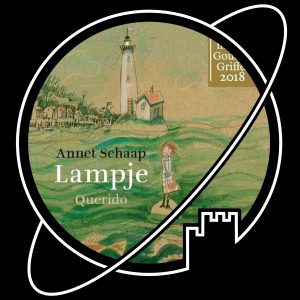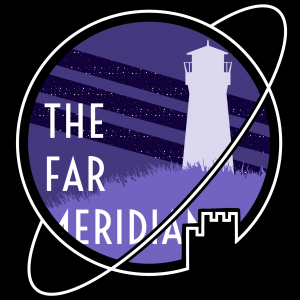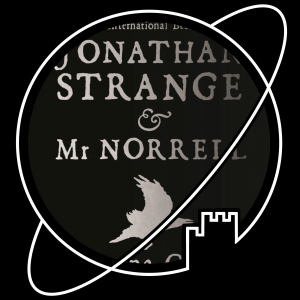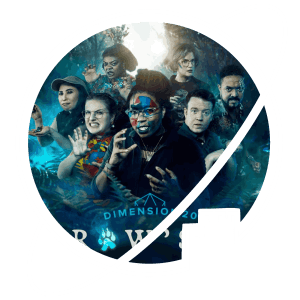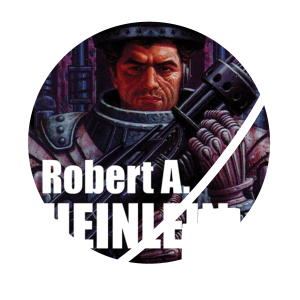Welcome to the Escape Velocity Collection!
We are an opinionated group of friends reviewing all sorts of fantasy and science fiction media. Don’t forget to get to know the curators and visit our curated Collection, where we discuss the stories that never cease to transport us to another world.
Will you escape with us?
LATEST POSTS:

- Collected on:
- Directed by Peter Jackson
- Starring Elijah Wood, Ian McKellen, Liv Tyler, Viggo Mortensen, Sean Astin, Cate Blanchett, John Rhys-Davies, Billy Boyd, Dominic Monaghan, Orlando Bloom, Christopher Lee, Hugo Weaving, Sean Bean, Ian Holm, Andy Serkis, and others
- Published in 2001
- Runtime: 558 minutes for normal people, 686 minutes for real fans
- It's the entire the Lord of the Rings Trilogy!
Peter Jackson’s legendary the Lord of the Rings movie trilogy hardly needs introduction – it is the epic tale of a halfling from a peaceful land that gets entangled in the affairs of the Big Folk when it turns out a family heirloom is the key to defeating evil forever.
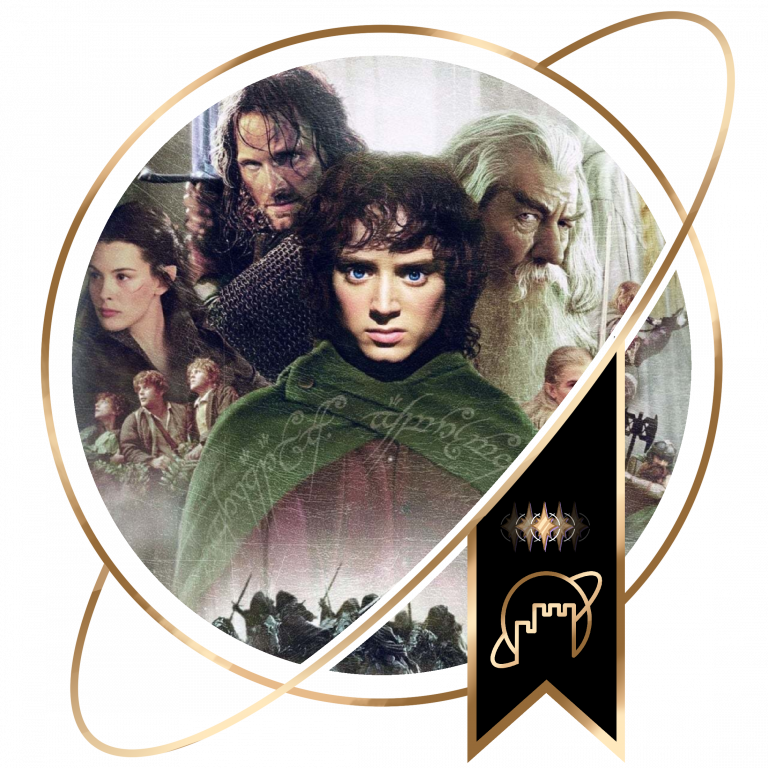
Peter: Welcome to this spoiler-free (though really, is this a story that can still be spoilt?) discussion Peter Jackson’s film adaptations of J.R.R. Tolkien’s The Lord of the Rings, which we’ve decided to add to the Escape Velocity Collection, a series of items that we believe represent the absolute peak of what the speculative genre has to offer.
There are some pieces of media which everyone knows, and which have been so influential that the Collection just isn’t complete without them. The Lord of the Rings-film series is one of them. Below, our curators discuss what Peter Jackson’s movies have meant to them and their experience in the fantasy genre.

Jop

Robin

Peter

Key
Words can hardly express how important those movies are to me – it’s frankly irrational and a little unhealthy.
I think however, that the Lord of the Rings movie trilogy is an absolute triumph of filmmaking. Almost everything about them is right. The production values are great. New Zealand is great. The acting is great. The music is so good that they changed the Oscars’ rules so Howard Shore could win one twice.
I would not lie if I said that I think of these movies on a literal daily basis. The main reason is that probably my favourite way to wind down is painting Middle-Earth Strategy Battle Game (MESBG) miniatures – and that hobby takes up a lot of my free time. I own over a thousand minis – as I am sitting here writing, my painting station with a bunch of them and a shelf full of rulebooks are sitting to my left. I have a chess set composed of MESBG minis on my right. There is an army of MESBG miniatures on display in my living room.
In fact, I first came into contact with the movies through the miniatures. When I was nine years old, a friend owned a set of Uruk-Hai which he had painted and showed to me. They looked absolutely amazing. I kept nagging until my parents finally let me watch the movies. For the next few years after that moment, my sister and I watched at least one Lord of the Rings movie every two weeks (though the first couple of times, I remember my parents sending us to sit in the hallway during most of the battle scenes). I still try to have at least one extended edition marathon every year. As a result, I know most of the lines by heart. I still get goosebumps at all the right times. You probably do not want to watch these movies with me.
Peter Jackson, to me, created the ultimate fantasy experience, and everything that will ever be made after it (and most of what came before) will be measured against his achievement.


I share Peter’s emotions; these movies changed my life in an unimaginable way. From the moment I first saw them – I was 10 or 11 years old? – they’ve instilled me with a sense of wonder, adventure and (in my darkest days) even hope. They were the inspiration for countless backyard adventures with my friends in which I played ‘Jopdalf the Wizard’, as well as the kickstart to my passion for writing (fantasy). I still watch them at least once a year, and they are my go-to comfort movies. Similar to Peter, there are Lord of the Rings memorabilia scattered throughout my house.
This movie trilogy is simply divine. In fact, I truly believe they aged better than most other movies from the last twenty years. When Peter Jackson filmed The Lord of the Rings, he didn’t have access to all the modern filmmaking techniques and technologies that are available today. However, he made up for it with creativity and cleverness that can’t be matched by all the CGI in the world. The same can be said for all the crew members that made the production of these movies possible.
There’s more praise to give, of course. The acting in these movies is sublime, a compliment that’s applicable to the whole cast, in my opinion. And indeed, Howard Shore’s beautiful music still hasn’t found its match.
The one real complaint I’ve heard people have with this trilogy, is that they are quite long. I guess that’s true. However, sometimes I have exciting dreams that show me completely new scenes. I suppose that means my subconscious wouldn’t have minded a few minutes extra for these movies.
I may not quite be able to match up to Peter- or Jop-levels of excitement, but the Lord of the Rings movies have been absolutely formative for me as well and I still love them dearly. The first time I watched them was with my sister and my two cousins, by my best guess I was around 9 or 10 years old. For weeks afterwards, whenever we played together we couldn’t stop running around and pretending to shoot arrows while surfing off of the tusks of giant Olifaunts like Legolas. After that, every year we would plan a weekend during our summer holidays where we would turn our entire living room into a screening area and watch all three movies in a row. Bless my parents for allowing this. These days I mostly keep my viewings down to once every few years, but every time I free up the time and sit down for it, it is always an absolute joy.


The first time I saw the LotR-trilogy was with a friend from elementary school. I think we were 11, maybe 12. He was a fan, I was a newbie. The movies didn’t struck me as an inspiring story, more as a lot fighting. It was fine, but not my cup of tea. Fast forward a couple of years and I found myself in a group of friends completely enamoured with the world of Tolkien. They insisted on a LotR-marathon and I went with it. It changed my life. Not really because of the movies, I have to admit, but because it brought me closer to friends who have never left my side since. I have come to appreciate the story and the characters, definitely, but for me LotR is inextricably linked with friendship. And I think that is what great stories do, they bring people together. We can laugh, cry, scoff, criticise and romanticise LotR, together. Like that time one of us ran from home. Or that time friends came and went while the diehards remained glued to the couch for twelve hours. Or that time we started a fantasy review platform. Or…
Conclusion
I don’t think there is much to add here, other than The Lord of the Rings singlehandedly put Fantasy as a genre back on the map and sparked a wave of enthousiasm that has not been matched since (not even by HBO’s Game of Thrones). These movies are the textbook definition of genre defining, and incredibly good. If you haven’t seen them yet, (i) How? (ii) cancel your plans for tonight and watch The Fellowship of the Ring, its on Netflix nowadays; (iii) Is it even possible to not have seen these movies? Did you actively run away from them? Are you ok? What is it like to live in a world without Ian McKellen’s Gandalf? (iv) HOW?
On that note, we would like to leave you for now – stick with us for more reviews and additions to the collection, and in the meantime: Happy Escaping!


- Book written by Robin Hobb
- Published in 1995
- Its the entire Farseer Trilogy!
- First Trilogy of the Realm of the Elderlings Series
As the illegitimate son of the Crown Prince, young Fitz holds a difficult position in the royal court of the Kingdom of the Six Dutchies. He is not publicly acknowledged by his family and so he grows up as a stableboy, while in secret his grandfather King Shrewd has him trained to become an assassin. At the same time, he has to learn to handle the hereditary magic that is part of his bloodline. Threats to the Kingdom, both from outside of its borders and from within, will force Fitz to consider where his true loyalties lie.
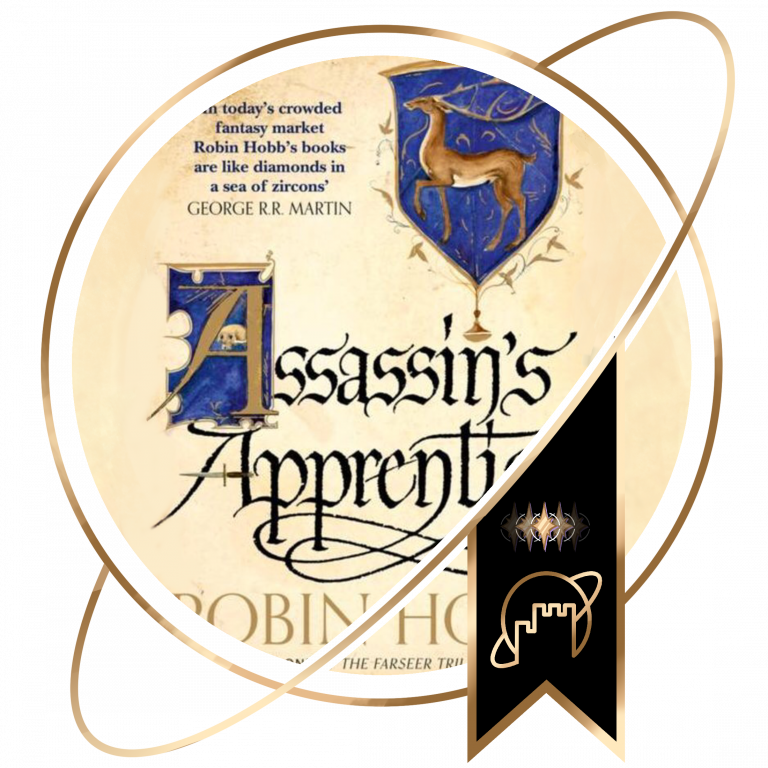
Welcome to this in-depth, spoiler-free discussion of The Farseer Trilogy by Robin Hobb, the first trilogy in her now 16-book Realm of the Elderlings saga, which our curators Jop and Robin added to the Escape Velocity Collection, a series of items that we believe represent the absolute peak of what the speculative genre has to offer.
The Realm of the Elderlings is popular amongst our curators, and one of those items that people fight over to have the right to add to the collection – so this space is a little more crowded than usual. Still, I challenged both Jop and Robin to defend their addition to the Collection – why should we all give The Farseer Trilogy a priority spot on the top of our reading lists?
Defended By

Jop
&

Robin
Versus

Peter
So, before all else – when did you first read The Farseer Trilogy and why did you fall in love with it?


I started reading Assassin’s Apprentice when I was only a little sprout of ten or eleven years old. I had recently seen The Fellowship of the Ring (and obviously I loved it) and was determined to read all the fantasy that the library had to offer. The book’s cover told me Robin Hobb(it) was heavily inspired by Tolkien and, frankly, that marketing trick was enough to sway me then. Luckily, I’ve been hooked ever since.
Maybe it’s because I was roughly the protagonist’s age when I first read the Farseer Trilogy that I fell in love with it. Although his life is never really desirable, I still was jealous of the adventures he got to go on, as well as the unique relationships he forged with some of the other characters. It was very escapist.
When I reread it at later ages, however, I found I got different things out of it than before. The Realm of the Elderlings and its characters grew along with me. It was no longer solely the plot events that appealed to me, but also the characters, the worldbuilding mysteries and the various themes. Everytime I read these books, I discover something new. In my opinion, that’s what makes them masterful.

I started reading Robin Hobb’s work around four years ago now. After a relatively long period when I had been reading almost exclusively contemporary fiction, I was looking for a good fantasy series that would draw me into its world the way Harry Potter and The Lord of the Rings used to do when I was younger. I asked my friends for recommendations, and of course Robin Hobb was on the top of the list of books that Jop suggested to me. It did not take long for me to get completely hooked: I raced through all 15 books in about six months, just in time for the release of the 16th and final instalment.
This series was exactly what I was looking for. It has so many characters that I fell deeply in love with, and they all felt so real to me that I actually found myself missing them after finishing the books. I like each trilogy on its own more than enough to want to add them to the collection, but what makes Robin Hobb’s works truly extraordinary to me is the way the trilogies build on each other. By the time you get to the end you have watched these characters grow up and age, and you have watched their world change around them. It might take some stamina to get that point, but I personally enjoyed every step of the way.
Characters
I know our opinions differ somewhat on this topic, so I think that characters are a good place to start. The story’s main character is FitzChivalry Farseer, the bastard son of the crown prince of a relatively generic medieval kingdom. His story starts when he is a child, and follows him as he grows up and starts going on his own adventures. How did Fitz strike you as a main character?


I love Fitz. However, most of the time my feelings for him can be summarized in the following sighing exclamation: “Oh Fitz…”
In theory, Fitz is a very smart and capable person, but his insecurities and morals tend to blind him at times. These ‘flaws’ can be frustrating, but are ultimately part of what makes him a likeable character to me. I saw some of my own inner struggles reflected in his. Certainly when I was an angsty teenager myself, Fitz acted as an instructive companion on how (not) to handle things. In some ways he is very vulnerable, and I like that in protagonists.

Agreed, I absolutely love Fitz because he is such a complex character. Even though his blindspots and stubbornness sometimes lead him to make bad decisions, I got to know his way of thinking well enough that I understand his reasoning, even though I might not always agree with the decisions themselves.
The depth of his character is shown by the ways in which his childhood traumas clearly impact his whole way of thinking, and also in the ways he manages to lie to himself about things that he finds too painful to consider. He is so incredibly loyal to the people around him, and the fact that he is unable to see how much they love him is one of the things which makes his story so tragic. I find myself alternating between loving him, pitying him, being amused by him, being incredibly frustrated with him, and then back to loving him. Sometimes all within the space of a single paragraph.
Well, I certainly felt some of those emotions when reading about Fitz, but love… I have found from my conversations with various people that read the books that Fitz is a rather controversial, love-him-or-hate-him kind of character, with very little middle ground. Suppose you were someone like me, and after the first book, you realise you’re mostly frustrated with Fitz’ questionable and self-destructive decisions. Do you think this series is still worth reading if Fitz makes your skin crawl?


Well, I personally think it’s quite difficult to enjoy any story written exclusively from the first-person perspective of a character you dislike (you can’t really escape them). However, just in case I’m wrong about this notion, I’d say the Farseer Trilogy has an absolute stellar cast of side-characters that counterbalances Fitz. Most of these characters have their own motives and complicated backstory, which can be glimpsed between the lines long before it comes into play in the plot. And though other readers might not necessarily like all of the side-characters, I’m certain there are always at least a few who’ll speak to them. Some of my favorites? The Fool and Nighteyes, absolutely. But I can’t bear to not also name characters like Kettricken, Verity, Patience and Burrich. They are just all so very…human, in a good way. At times I almost forget they are fictional characters.

I agree, this series has so many other great characters besides Fitz. However, if you are already annoyed with Fitz after the first book, then I am afraid you will not grow to like him any better during the second and third books of this series. Honestly, in that case these books might just not be your cup of tea.
Worldbuilding
I labelled the Six Duchies, the Kingdom in which the story is set, a ‘relatively generic medieval kingdom’ above. I think that in general, ‘relatively generic medieval’ is a rather apt description of the world that Robin Hobb has created. Buckkeep, the seat of the Farseers’ throne, is something of a small, early medieval fishing town. There are some vikings raiding the shores, and a couple of tribes in the creatively named Mountain Kingdom. We can’t talk about it too much, but I feel it is only towards the end of the third book that Hobb does any worldbuilding that I feel could be called original. Am I being too harsh here?


True, Robin Hobb is not the first author to locate her fantasy series in a world vaguely resembling a (romanticised version) of medieval Europe. However, I would hesitate to call the Six Duchies ‘generic’, because to me that would mean that not a lot of attention has been paid to the worldbuilding. With Robin Hobb, this is absolutely not the case. The kingdom of the Six Dutchies has a varied geography and a well thought-out political situation that is tied to this geography. Details about the daily lives of the inhabitants and glimpses from their history and folklore make the world seem real enough that you can imagine living there. There are also some hints given about a much more distant history, through evidence of a previous civilization that has inhabited the area long before the Six Dutchies was founded. To me, the fact that the worldbuilding is detailed and believable is much more important than whether it is completely unique in its kind.

I agree with Robin. Sure, not all worldbuilding aspects will swipe originality awards, but it’s well thought out enough to give this world an unique atmosphere that fits the story. In addition, I would argue that the magic system (the Skill and the Wit), which comes into play quite early in the first book, is actually very authentic and intrinsic to the story. It maintains an excellent balance between established rules, simplicity and mysteriousness, and I have yet to encounter a magic system I enjoy just as much.
Titles
One of the things that I found most odd about the whole trilogy was the ‘Assassin’s’ moniker that Hobb gave all three books. This is a slight spoiler, but I think one that is relevant to potential future readers – Fitz isn’t what you’d expect of a classic D&D assassin, and the books aren’t assassins’ stories, about infiltration, sneaking in the dark, and cloak and dagger. If I remember correctly there are really only two assassination-related plotlines, both somewhere in the first book, and neither of them are about the assassination at all. The titles feel like false advertising to me – what do you think? Why do you think Hobb chose the titles she did?


Although I understand the sentiment that these books are not necessarily classic assassins’ stories, I must give you some resistance here. There might be some lack of assassination plotlines, but this does not negate that Fitz is in fact an assassin. I would even argue that him being a royal assassin is one of his defining character traits for the rest of the series.
At a very young age, Fitz is trained as an assassin, a tool to be used. Regardless of what he does with this training, it’s a mindset he constantly carries with him. It drives his actions and impacts his development. Thus, Fitz’ story is a story about an assassin.
But I’ll agree (along with most other fans, I believe) these titles are not great. I personally doubt Robin Hobb had much say in them, and is now only commiting to the formula. Interestingly, the Dutch translations of this trilogy are slightly more creative. Assassin’s Apprentice is translated as ‘Apprentice and Master’ while Assassin’s Quest is translated as ‘Skill and Wit’. So, when I first read these books, I wasn’t aware of the assassin advertising.

Fitz is absolutely an assassin, but while his training informs a large part of his character, I agree that it is not the main focus of the story. So in that sense the titles could be viewed as slightly misleading. But, more importantly, they are just plain bad titles. I would say I know the books pretty well, but even I have trouble remembering which book is called what. I do like the covers though, so hopefully these will still draw people to the books even despite their unimaginative titles.
Message
I know you both love these books a lot, so let’s take a bit of a deeper dive into their message. One of the things that stood out to me is that many (if not all) of the characters in these books are locked in constant struggles – be it against themselves, an implacable foe, the world’s expectations of them, mistakes of the past – or all of them combined. It sometimes appears as if nothing is ever easy and the only thing to do is to keep swimming against the stream. In the end, that turns out to be the right choice in these books almost every time. Do you feel this applies to real life? Don’t you think that sometimes if life is that tough, perhaps you should take a different path?


Hahaha, are you saying real life isn’t a concatenation of constant struggles and obstacles?
But you’re not wrong. These characters don’t live easy lives. Sometimes months go by in which they live happily and carefree, but sooner or later a catastrophe (minor or major) will catch up to them. I might be somewhat of a pessimist (or just very unlucky), but I believe this also rings true for our very own lives. And, more often than we’d like, we have little choice than to swim against a stream, for the alternative might be easier, but is often actually less beneficial in the greater scheme of things.
Fate – and the changing thereof – is a major theme in The Farseer Trilogy and I’ve always found it inspiring how Robin Hobb handles it. Yeah, it is not easy to make a significant impact on life, to change things. It has never been easy! But still, to see Fitz and the others succeed because of their persistence, despite the hard times, makes it easier to withstand such struggles in real life. Even when the results are bittersweet, it’s very cathartic for me.

I think that a lot of the time, the main reason why the characters in these books struggle so much is that they are trying to balance their different loyalties, when these are often in direct opposition to each other. Yes, there is often an easier path that they could have chosen, but this path would mean either disappointing people they love, or giving up on their own wishes or values. Instead of choosing one or the other, they are desperately trying to find a middle ground where they can stay true to themselves while also fulfilling the expectations of their loved ones. I think the point that Robin Hobb makes is that there are no easy answers when making these decisions, but that it is worth fighting to try to get it right. That is something that I can get behind.
Conclusion
We’ve probably already written more text than most of you will read, so if you got here: congratulations! Let’s wrap up. I think in summary we can say The Farseer Trilogy is a heavily character-driven story about a flawed, stubborn, loyal, struggling, human protagonist set in a world that thrives in detail if not in originality. Perhaps more importantly, it is the starting point for a saga with over a dozen more books, by the end of which you might know Fitz better than you know yourself. Would that be fair to say?


You hit the nail right on the head. This series has come to mean a lot to me and while I understand that it might not be for everyone, I have no hesitation whatsoever in adding it to our Collection.

Agreed. There are few books that have managed to evoke such powerful and long-lasting emotions as The Farseer Trilogy has done for me, so their place in the Collection is well-earned!
Alright folks, that’s been us for today – but be warned, we’re far from finished. Given how crazy our curators are about it, I’m sure we’ll be discussing more Realm of the Elderlings in the future!

- Movie directed by Peter Jackson
- Based on The Return of the King by J.R.R. Tolkien
- Starring Elijah Wood, Ian McKellen, Liv Tyler, Viggo Mortensen, Sean Astin, Cate Blanchett, John Rhys-Davies, Billy Boyd, Dominic Monaghan, Orlando Bloom, Christopher Lee, Hugo Weaving, David Wenham, Bernard Hill, Andy Serkis, Miranda Otto and others
- Published in 2003
- Runtime: 200 minutes (theatrical edition) or 251 minutes (extended edition)
- Part three of the Lord of the Rings Trilogy
While Saruman is defeated, the armies of Mordor are still advancing into the lands of Gondor. As the remaining members of the Fellowship prepare for war, Aragorn has to decide if he’s ready to claim his kingly heritage.
Near to the lion’s den, Frodo is carrying the One Ring closer and closer to its final destination. However, how much longer can he withstand the toll this task is taking on him?

(Nota bene: this review relates to the extended edition of the movie. Though I’ve once seen the theatrical editions of the The Lord of the Rings trilogy, the extended editions always have my preference, as I’ve seen them more times than I can count.)
As I’ve also stated in the Collection post: I absolutely love these movies. The writing, the acting, the music, the cinematography, the art and the landscapes, the lack of toxic masculanity; everything is simply magnificent.
All in all, The Return of the King might be my least favourite installment in this trilogy, because it’s dominated by a lot of fighting and battle scenes. On the other hand, some of my absolutely favourite moments are inherently bound to these same scenes, so I’m not really complaining. It’s impressive how Peter Jackson managed to make all these scenes aesthetically pleasing, while at the same time maintaining J.R.R Tolkien’s anti-war sentiments. Yes, at times fighting can have a noble cause, but bloodshed knows no beauty. Special kudos to Bernard Hill, Miranda Otto and Karl Urban for excellently demonstrating this specific side of the story.
Remarkable enough, I have no problems whatsoever with the main complaint many have with The Return of the King, namely its long ending (or rather, the fact that it has several). By now you’ll have spent enough time with these characters that a proper send-off is well-earned.
The Return of the King is an epic conclusion to an epic story, and honestly I’m quite excited to rewatch this trilogy soon!
Tagged:
- Movie directed by Peter Jackson
- Based on The Two Towers by J.R.R. Tolkien
- Starring Elijah Wood, Ian McKellen, Liv Tyler, Viggo Mortensen, Sean Astin, Cate Blanchett, John Rhys-Davies, Billy Boyd, Dominic Monaghan, Orlando Bloom, Christopher Lee, Hugo Weaving, David Wenham, Bernard Hill, Andy Serkis, Miranda Otto and others
- Published in 2002
- Runtime: 179 minutes (theatrical edition) or 223 minutes (extended edition)
- Part two of the Lord of the Rings Trilogy
The Fellowship of the Ring has been broken and its members scattered. Frodo and Sam continue their way towards Mordor to destroy the One Ring, but soon find themselves in need of a guide. An unlikely candidate crosses their path.
Meanwhile, the quest of Aragorn, Legolas and Gimli to rescue Merry and Pippin from Saruman’s Orcs leads them into the war-torn lands of Rohan.

(Nota bene: this review relates to the extended edition of the movie. Though I’ve once seen the theatrical editions of the The Lord of the Rings trilogy, the extended editions always have my preference, as I’ve seen them more times than I can count.)
As I’ve also stated in the Collection post: I absolutely love these movies. The writing, the acting, the music, the cinematography, the art and the landscapes, the lack of toxic masculanity; everything is simply magnificent.
I might belong to a minority in this, but The Two Towers is my favorite installment in The Lord of the Rings trilogy. Its themes of hope against all hope, withstanding grief and decline in an attempt to do some last good before the end, as well as the battle of nature against industrialism get me everytime. The dramatic low points are extremely dark and desperate, but somehow remain relatable. The Two Towers is an excellent example of how an otherwise boring story of good versus evil can explore themes that are still applicable to real life.
War and battle are central aspects of this movie, so expect a lot of fighting scenes. Similar to The Fellowship of the Ring, these scenes contain choreography that is pleasing to the eye, with little to no gore.
Don’t be afraid if fighting isn’t necessarily your thing. Luckily there are many other things to look forward to, such as the excellent performance of Andy Serkis as Gollum/Smeagol.
Also: burárum…
Tagged:
- Book written by Robin Hobb
- Published in 1997
- Part 3 of the Farseer Trilogy
- Third part of the Realm of the Elderlings Series
The king is dead, Prince Verity is missing in action, and Prince Regal has left the coastal duchies to their own devices against the Red Ship Raiders. Meanwhile, Fitz has trouble forgetting his treatment in Regal’s dungeons.
The Farseer family needs him now more than ever, but Fitz finds himself in an unique situation. In a world that believes him to be dead, he finally has the chance to start anew. On the other hand, this might be the perfect opportunity to enact his revenge on those who hurt him…

If you’ve read Royal Assassin, it won’t have escaped your attention that we left the Six Duchies and our characters in quite a precarious state. This book picks up almost precisely where the last one ended, and (as the title adeptly announces) will bring us a quest that will decide everyone’s fate.
For the first time since we’ve known him, Fitz will be dependent on his own capabilities and insights before he is reunited with some of the other characters we’ve come to love. Some people might find the pacing of these chapters erring on the slow side, I think, but they contain some important (character) developments. Furthermore, this book treats us to some intriguing worldbuilding lore.
If you ask me, one of Robin Hobb’s greatest strengths as a writer is the way she constructs life-like endings. The ending of an epic-scale plot point does not necessarily result in a neatly rounded conclusion for its characters, and I feel many authors often forget about this. Sure, Robin Hobb will provide you with closure, but as long as the characters still live, they will have stories to tell. These low-key ambiguous endings are part of why my thoughts, sooner or later, always return to Robin Hobb’s books. The conclusion of Assassin’s Quest is a wonderful example of such a pleasantly haunting ending.
If you liked The Farseer Trilogy (as you should), don’t hesitate to continue with the other books in The Realm of the Elderling series. Eventually, you’ll arrive at Fool’s Errand, which might just be my favourite!
Tagged:
- Movie directed by Peter Jackson
- Based on The Fellowship of the Ring by J.R.R. Tolkien
- Starring Elijah Wood, Ian McKellen, Liv Tyler, Viggo Mortensen, Sean Astin, Cate Blanchett, John Rhys-Davies, Billy Boyd, Dominic Monaghan, Orlando Bloom, Christopher Lee, Hugo Weaving, Sean Bean, Ian Holm, Andy Serkis, and others
- Published in 2001
- Runtime: 178 minutes (theatrical edition) or 208 minutes (extended edition)
- Part one of the Lord of the Rings Trilogy
Frodo Baggins is a halfling from a peaceful land who gets entangled in the affairs of the Big Folk when it turns out the ring of his uncle is the key to defeating the Dark Lord Sauron forever.
What follows is a quest through unkown and dangerous lands, to ensure the Ring won’t fall into the wrong hands.

(Nota bene: this review relates to the extended edition of the movie. Though I’ve once seen the theatrical editions of the The Lord of the Rings trilogy, the extended editions always have my preference, and I’ve seen them more times than I can count.)
As I’ve also stated in the Collection post: I absolutely love these movies. The writing, the acting, the music, the cinematography, the art and the landscapes, the lack of toxic masculinity; everything is simply magnificent.
The Fellowship of the Ring’s greatest strength (compared to its sequels) is the sense of magical adventure that is so eminent at its core. Though the stakes are ultimately high, the protagonists’ journey is still small scale. They travel through stunning wildernesses and explore impressive deserted civilizations without being drawn into complicated politics and subplots. The goal and obstacles are clear, but many other things are still clouded by mystery.
Whenever I’m trekking through mountains or forests with my friends, I fondly think of the Fellowship’s adventures in this movie.
If you are in the unique position of having never seen these movies, don’t be discouraged by the lore exposition The Fellowship of the Ring begins with. Even if things are unclear at first, you’ll catch up on the details later on. This movie works well if you simply let the story wash over you, similar to how Frodo is pulled into an adventure he hardly understands. It’s a unique feeling I’d gladly experience all over again, given the chance.

There is really only one reason to be reviewing The Fellowship of the Ring, and that is to celebrate the masterpiece it is.
I am uploading this review at the occasion of the movie’s 20th anniversary, which is a mind-boggling fact in and of itself – do these movies feel two decades old to you? Watching them now, it sometimes feels like the men’s haircuts are the aspect of the movie that aged most poorly. Even the CGI, which is the obvious weak spot, has held up incredibly well.
As I’ve said in our Collection post, I feel Peter Jackson has, with his movie trilogy, created the ultimate fantasy experience. I am thinking of things to highlight as stand-out achievements, but I keep finding every aspect is worthy of note. If I would have to pick, I would have to say the three most notable achievements of this movie are the costume- and prop design, which has set the standard for every fantasy film coming after; the way Middle Earth was brought to life in the gorgeous sets and locations in New Zealand, and finally, the music, which I think is hands down the best soundtrack in all of cinema, ever.
I particularly love Fellowship, because while its scale is often much smaller than the other two parts in the trilogy, it already gives you an idea of the great depth of the world, gives you mysterious characters and shots that make you wonder. It makes you feel like the hobbits, thrown into a wonderous and dangerous world of mighty lords and great warriors. At the same time, it links the quaint world of the Shire to the wonders of Rivendell, the vastness of Khazad-Dûm and the foreboding marble of Orthanc. It introduces wizards, elves, orcs, trolls, uruks – all without appearing overwhelming. It makes you feel like the hobbits could make a difference if they hold on to each other. It celebrates the love between friends and companions, allows its characters to mourn. I could go on for twenty more pages and I would not be done.
It is, as I said, a masterpiece. If there is one movie I could see for the first time again, it would be The Fellowship of the Ring.
Tagged:
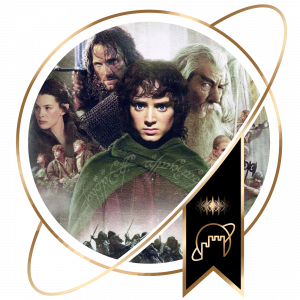
Collected: The Lord of the Rings Movie Trilogy by Peter Jackson
COLLECTION: Peter Jackson’s legendary the Lord of the Rings movie trilogy hardly needs introduction – it is the epic tale of a halfling from a peaceful land that gets entangled in the affairs of the Big Folk when it turns out a family heirloom is the key to defeating evil forever.
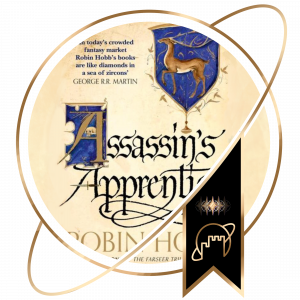
Collected: The Farseer Trilogy by Robin Hobb
COLLECTION: As the illegitimate son of the Crown Prince, young Fitz holds a difficult position in the royal court of the Kingdom of the Six Dutchies. Threats to the Kingdom, both from outside of its borders and from within, will force Fitz to consider where his true loyalties lie.
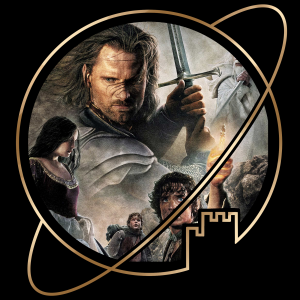
Review: The Return of the King – Peter Jackson
Part three of The Lord of the Rings trilogy. As the remaining members of the Fellowship prepare for war, Aragorn has to decide if he’s ready to claim his kingly heritage. Meanwhile, close to the lion’s den, Frodo’s carrying the One Ring closer and closer to its final destination.
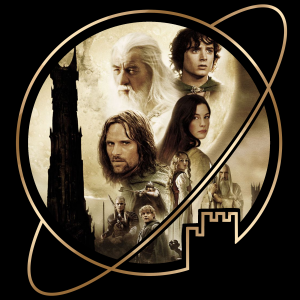
Review: The Two Towers – Peter Jackson
Part two of The Lord of the Rings trilogy. The Fellowship of the Rings has been broken and its members scattered. Frodo and Sam continue their way towards Mordor to destroy the One Ring. Meanwhile, the quest of Aragorn, Legolas and Gimli to rescue Merry and Pippin from Saruman’s Orcs leads them into the war-torn lands of Rohan.
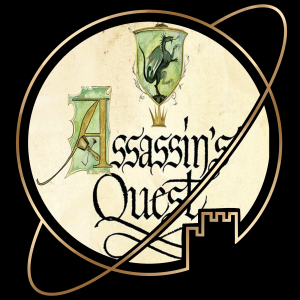
Review: Assassin’s Quest – Robin Hobb
Part three of the Farseer Trilogy. The king is dead, Prince Verity is missing in action, and Prince Regal has left the coastal duchies to their own devices against the Red Ship Raiders. The Six Duchies need Fitz now more than ever, but is he willing to reclaim his life as an assassin?
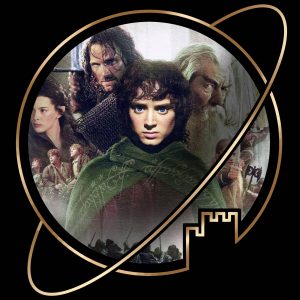
Review: The Fellowship of the Ring – Peter Jackson
Part one of The Lord of the Rings trilogy. Frodo Baggins is a halfling from a peaceful land who gets entangled in the affairs of the Big Folk when it turns out a family heirloom is the key to defeating evil forever.






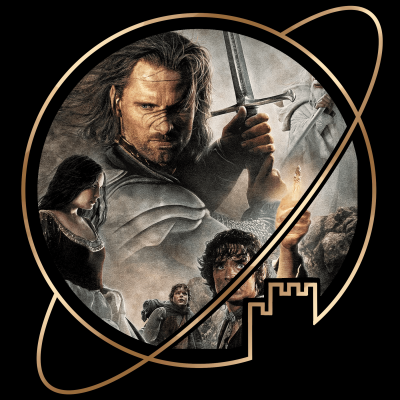

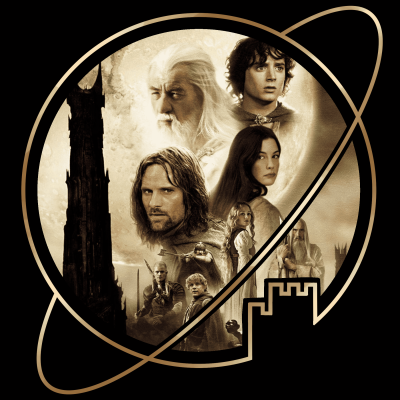
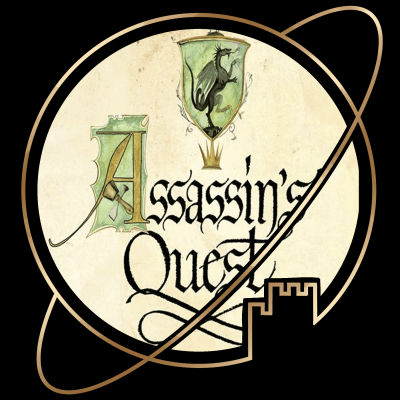
![LotR[3356] LotR[3356]](https://escapevelocitycollection.com/wp-content/uploads/elementor/thumbs/LotR3356-qo1nbdgi8v3mxemzomuck0n379uikd2fjfqk541k0w.jpg)
